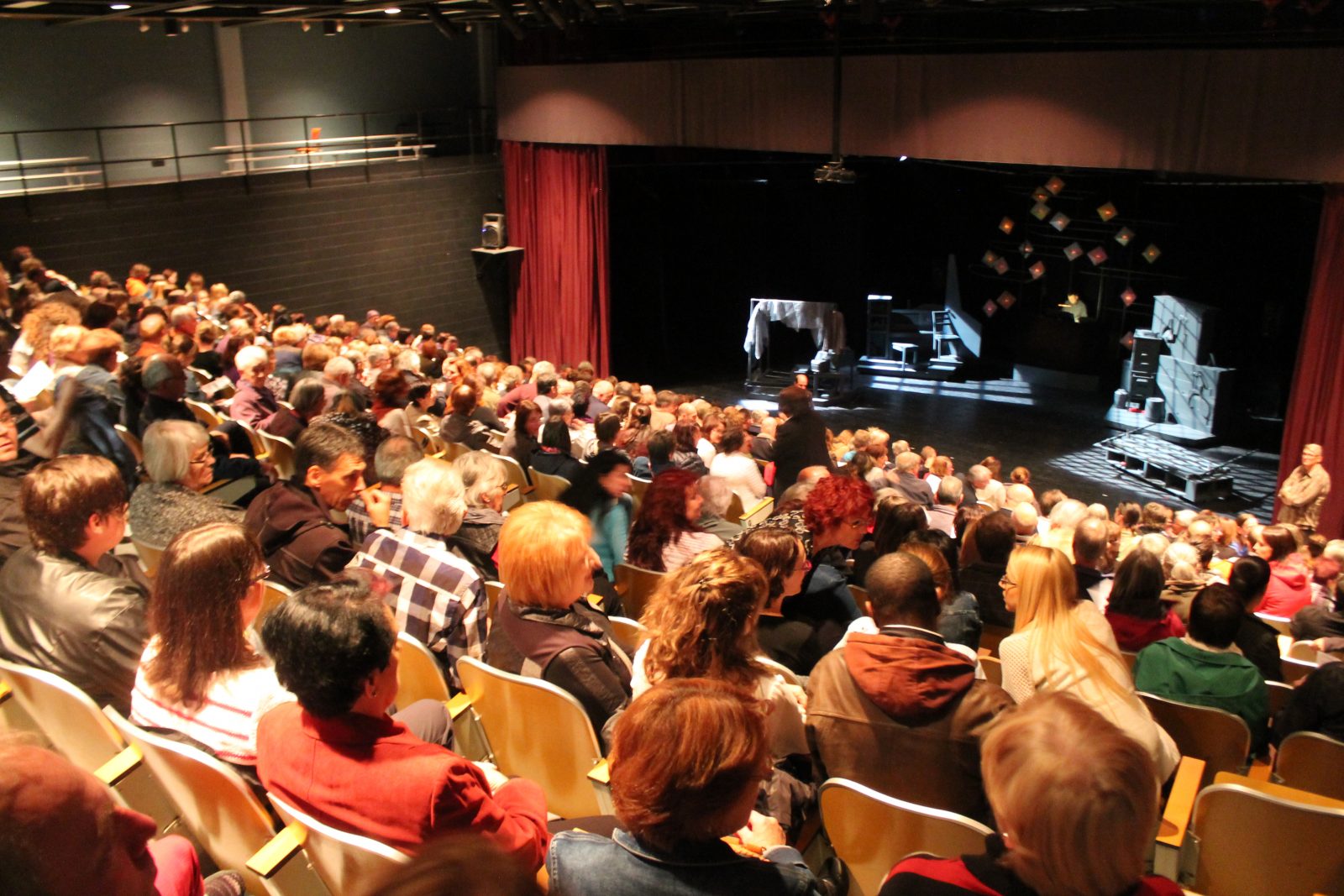It is no easy task to take on the role of mirror for a community that has gone through a major disaster; balancing the drama of storytelling to the point where it can captivate an audience without mocking or exaggerating the events that took place. This is the task that Sherbrooke’s Theatre des Petites Lanternes (TPL) took on in its newest “Great Harvest of Words” project, based in the Granit MRC. Comme un grand trou dans le ventre, or That Sinking Feeling in Your Stomach took to the stage for the first time in the Auditorium of Lac-Mégantic’s Polyvalente Montignac on Friday night for a full audience of over 400.
“We wanted to give people a voice, but also be an accurate reflection,” said TPL Artistic Director Angèle Séguin, explaining that catharsis and community healing is a major component of the model on which this and past word harvests has been built. “We wanted people to feel like they were heard.”
As in past word harvest projects, the people of the region were called upon to participate in a number of interactive public workshops that allowed them to anonymously share their thoughts, feelings and recollections about their lives and hometowns.
Participants in the workshops were asked to reflect on the theme of “repères.” Translated directly into English the word is “benchmark,” meaning the standard to which something is measured, but in the French term covers a much broader spectrum and can be defined as an event that results in a before-and-after feeling; something that will always be remembered.
According to Séguin, who wrote the final script from the elements brought together through the workshops, nearly 1,000 residents of Lac-Mégantic engaged with the process in one way or another.
TPL was invited to engage the region in the word harvest not long after the initial tragedy in 2013 by representatives of the local health and community services based on work they had done on a similar project in Haiti following that country’s devastating earthquake in 2010. Workshops in the Granit MRC began roughly one year ago and the harvest came in, so to speak, this past January. Since that time Séguin and her creative team have been engaged in the production of the work that has become That Sinking Feeling in Your Stomach.
Drawing on that notion of “repères,” the play follows four main charaters through a before-during-after plot structure that, unlike in a Hollywood disaster film, makes no effort to pretend that Lac-Mégantic was a perfect little town prior to the explosion that killed 47 of its native souls. On the contrary, Séguin said that part of the focus of the piece is how tragedy highlights, emphasizes and mingles with the traumas we’ve already lived in our lives to shape our futures.
“The show speaks of the tragedy, but it also touches on many other personal tragedies,” the Artistic Director said. “That is what we saw in the booklets.”
But for two background lines in English, the action takes place entirely in French and revolves around the lives of those living in and around the community of Lac Megantic at the time of the derailment in the summer of 2013. Despite that focus, however, the themes of the stories that intertwine throughout the play are relatable to anyone living in the Eastern Townships. Havign been draw directly from the hearts and minds of the people living this realisty, the play reflects in a very real and tangible way on the challenges facing many small rural communities today in addition to the distinct fears that the tragedy itself brought up in anyone who lives near a rail line.
Nestled at the heart of the play’s set are twenty paper lanterns that, while also serving as part of the play’s lighting design, symbolically represent the 20 communities of the Granit MRC. As the actors onstage live out their lives before, during, and after the disaster, the action is interspersed with thoughts and reflections “voiced” from the lanterns. Whether sharing a moment of joy or pain, the lanterns light up either one at a time or sometimes in small groupings, linking the emotions being acted out on the stage with the tensions at play in the wider community.
“We lived all our lives next to the tracks,” one ghostly voice shares, “we saw them as nothing to fear.”
“We are refugees in our own town,” another recalls; a thought most poignant in the auditorium of the school that became the focal point of the community in the days and weeks after the explosion.
The lanterns shine a light on the bigger picture of the disaster, reminding all those present of the ripples a major event sends across the surface of the surrounding community.
“We couldn’t integrate everything the community had to say,” Séguin explained. “For me the lanterns symbolize the whole community, every milieu. When they light up it is like the whole community speaking.”
Comme un grand trou dans le ventre will be presented again at the Montignac Auditorium in Lac-Mégantic this coming Friday, the 2nd of October, at 8pm. As a part of that performance, the mayors of the 20 municipalities in the region have been invited to come receive a lantern on behalf of their community as a symbol of the ongoing recovery. Like the play itself, these lanterns have been made in collaboration with each village and/or town, taking inspiration from their geography, sense of belonging and shared history. They symbolise the specificity of each municipality but also the solidarity of the region.
After next Friday’s performance, the production will then move to Sherbrooke for a single performance on Tuesday the 6th of October at 8pm in the University of Sherbrooke’s Maurice-O’Bready Hall.
Owing to the nature of the story and the close relationship the audience is likely to have to the material at hand, the Mégantic performances have been operating on an admission by voluntary donation system. The performance that will take place in Sherbrooke is ticketed, however. Regular admission is $27 while seniors and students under 25 years of age can see the show for $23. Tickets are available from the box office at 819-820-1000.






